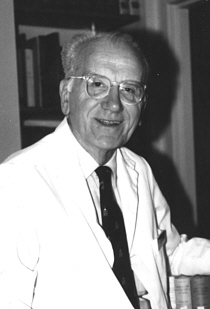
|
|
APRIL 2000 CONTENTS
|
|
PIONEERS GUEST BOOK
|
| During his more than 50 years at Hopkins, Victor McKusick has guided medical genetics out of obscurity and inot the limelight. |
|
Opening photo: McKusick: forging a new medical discipline. |
Pioneers of Promise
· · · · · · · · · · · ·
The Man Who Put
Genetics on the Map
By Melissa Hendricks

On February 22, 1943, Victor McKusick stepped off a train straight from the snowy fields of rural Maine and into an unseasonably warm day in Baltimore. It was exactly 50 years since the founding of the Johns Hopkins School of Medicine. Although he didn't know it at the time, McKusick would spend more than the next half-century at Hopkins dedicated to forging a new medical discipline.
Today McKusick is often called the "father of medical genetics" and is credited with patiently and relentlessly demonstrating the importance of studying the genetic basis of diseases and disorders. A man who his colleagues say lives and breathes medical genetics, he has seen the science grow from an obscure pocket of research to a fundamental core of medical science. "I like to say that the arrangement of genes on chromosomes is part of the micro-anatomy," says McKusick. "Just as the gross anatomy in the Middle Ages was important to medicine, every [medical] specialty now uses mapping genes for diseases."
McKusick, however, never proselytized about genetics, says David Valle, a Hopkins geneticist and pediatrician. He simply began to demonstrate--step-by-step through his own work and by highlighting the work of others--how understanding the genetic basis of diseases could help lead to new methods of diagnosis and treatment. "It was not a confrontational thing. He made the case for medical genetics simply by being so energetic and productive that people just couldn't avoid it," says Valle.
As a young physician, McKusick thought he would specialize in the study of heart defects. After earning his M.D. and completing his internship and residency at Hopkins, he worked as a cardiologist at Hopkins. Then one day, a man was admitted into his care who had a serious malfunction of his aorta. The man also had dislocated eye lenses and was unusually tall compared to the rest of his family. McKusick diagnosed Marfan's syndrome, a genetic disorder marked by these characteristic features. Soon he was treating other Marfan's patients and keeping records on the inheritance of the syndrome.
Not long after, patients with a variety of other genetic conditions began coming to McKusick's office for treatment and referrals and to volunteer for one of a growing number of studies. In 1957, he established the Division of Medical Genetics at Hopkins, a first-of-its-kind clinic and research center. Some of the center's most noted work involved studies of dwarfism among the Amish.
By the 1960s, researchers had identified the location on chromosomes of a handful of genes, including those for hemophilia and colorblindness, both on chromosome X. In 1968, McKusick's team mapped the gene for a blood group on chromosome 1, the first gene pinned to a non-sex chromosome.
Gene mapping accelerated, and McKusick began creating a catalogue of the new data about human genes and genetic disorders. In 1969, he published the first edition of this book, Mendelian Inheritance in Man. Now in its 12th edition, it may be the most comprehensive collection of genetics databases. It was also one of the first books to go online ( www3.ncbi.nlm.nih.gov/Omim/).
In 1960, McKusick founded the Short Course in Experimental Mammalian Genetics at the Jackson Laboratories in Bar Harbor, Maine. Almost 4,000 students have taken the course, which McKusick continues to co-direct. Through the short course and at Hopkins, "Victor has trained nearly all medical geneticists and workers in the area of medical genetics," says Valle, the course's other co-director.
McKusick also was one of the earliest scientists to suggest mapping the entire human genome; he first raised the possibility at a 1969 meeting at the Hague on birth defects. "I suggested that an approach to solving birth defects and genetic disorders in general would be to map all of the genes," he recalls. Later, he was the founding president of HUGO, a coordinating organization for international genome mapping and sequencing programs.
Not one to rest on his laurels, McKusick continues to work at Hopkins full time, though without pay, as University Professor of Medical Genetics. He spends most of his time overseeing OMIM and continues to see patients and teach. Says the man who has surpassed a half century at Hopkins, "I cherish my appointment very much."
GO TO SHORT COURSE, LONG ON INFLUENCE
RETURN TO APRIL 2000 TABLE OF CONTENTS.